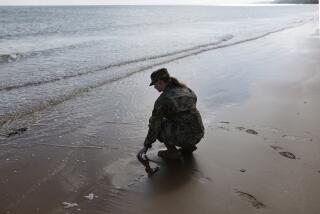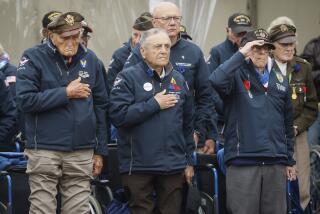Remembering victory
- Share via
The explosion of joy had not yet erupted. But there, in the heart of London that night, darkness was strangely absent on one city street. A stream of light illuminated almost an entire city block.
Some happy soul had raised a store window’s blackout shade. And for the first time in nearly six years, it was done without fear of inviting an air raid warden’s citation or German bombs.
That marvelous lighted scene, foretelling the end of Europe’s deadliest period, has stayed with me all these years. It was May 7, 1945.
I was a 20-year-old B-24 bomber radio gunner then and on a three-day pass from the U.S. Army Air Force’s base outside of Norwich, a five-hour train ride away. On a London Underground train to Piccadilly Circus, I had spotted a newspaper headline that screamed in thick black letters: “Unconditional Surrender Imminent.” The lighted street seemed to confirm the headline.
By 3 p.m. the next day, it was official — V-E Day.
Standing on the War Ministry balcony above Whitehall at that hour, a beaming Prime Minister Winston Churchill flashed his usual “V” sign. This time, though, his “V” for victory was no symbolic promise.
The hostilities with Nazi Germany were over. “This is your victory,” he told a huge crowd that had gathered.
Cheers grew into one giant party. People poured into the streets, shouting, dancing, embracing. They mounted double-decker buses and utility poles, waved flags, started bonfires and danced the hokey pokey around a statue of Queen Victoria. Sirens blared, car horns honked and church bells pealed.
In four words, a newspaper headline expressed the mood of the country: “Our Day of Days.”
I found myself drawn to Buckingham Palace later that day. A roar from the crowd and wild applause greeted the appearance of persons on the balcony. From where I stood among a mass of humanity, King George VI and Queen Elizabeth, their princess daughters, Elizabeth and Margaret, and Churchill were a distant blur.
That night floodlights illuminated Buckingham Palace and the Houses of Parliament for the first time since the Battle of Britain began in 1940. And Big Ben’s toll, signaling the official end of the war in Europe, was accompanied by exploding fireworks and screaming sirens.
The celebration went on for two days. Bus and train service in and out of London was halted, as more than a million people entered the city, jamming streets and blocking traffic. They had flocked there to witness and participate in these historic moments, crowding hotels and parks.
U.S. military personnel passes were extended for two days because of the mass transit stoppage. This was great for me, except that the Red Cross servicemen’s hotel and every other hotels had no vacancies, and my money had run out. But I wasn’t alone. I and hundreds of others spent a damp, chilly night trying to keep warm and sleep near one of the bonfires in St. James Park.
I met a thin, dark-haired girl who was also left out in the cold, unable to return to her suburban home because trains weren’t running. Doreen — that was her name — said her mother had also come to London years ago to celebrate the end of World War I and met and married a Yank.
She told me she couldn’t wait for the end of rationing, especially for the day when newly marketed nylon stockings from the U.S. would be available in England. Back in the States several months later, I answered her prayers, and mailed her three pairs. The anticipated thank-you note never arrived, though.
Memories of those tumultuous days will be rekindled as England observes the 65th anniversary of V-E Day on May 8. I’ll be there, recalling the joy and that chilly night in St. James Park. Only this time I’ll be with my wife of nearly 61 lucky years, and we’ll be spending the night in one of London’s luxury hotels.
Si Liberman is a retired editor of the Asbury Park (N.J.) Sunday Press.
More to Read
Sign up for Essential California
The most important California stories and recommendations in your inbox every morning.
You may occasionally receive promotional content from the Los Angeles Times.













